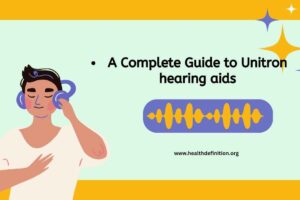
Sudden hearing loss (SHL) can be a life-altering experience, often occurring without warning and affecting one or both ears. This condition, which leads to a rapid and unexplained decrease in hearing, can be frightening and confusing. One of the most frequently prescribed treatments for sudden hearing loss is prednisone, a corticosteroid medication that reduces inflammation in the inner ear. But how quickly does prednisone work for sudden hearing loss? In this article, we’ll explore the role of prednisone in treating SHL, its effectiveness, and factors that influence how quickly it works.
What Is Prednisone and How Does It Work?
Prednisone is a synthetic corticosteroid that works by mimicking the effects of natural corticosteroids produced by the adrenal glands. Corticosteroids, including prednisone, are commonly used in medicine to treat inflammation caused by various conditions, such as autoimmune disorders, allergies, and infections. When prescribed for sudden hearing loss, prednisone aims to reduce inflammation in the inner ear, which is believed to be one of the main factors contributing to the hearing loss.
The cochlea, the hearing organ in the inner ear, relies on a delicate balance to properly transmit sound signals to the brain. Inflammation can disrupt this process, leading to a sudden drop in hearing ability. By reducing inflammation, prednisone can potentially improve cochlear function, helping to restore hearing over time.
The Role of Prednisone in Treating Sudden Hearing Loss
Prednisone is one of the most commonly prescribed medications for SHL, and it is generally used when the cause of the hearing loss is unknown, or there is a suspected inflammatory or autoimmune origin. Research has suggested that corticosteroids like prednisone may be particularly effective when administered early after the onset of hearing loss.
When taken soon after the symptoms of sudden hearing loss begin, prednisone can help reduce inflammation and swelling in the inner ear. In many cases, early treatment is crucial because it may improve the chances of full or partial recovery. However, the effectiveness of prednisone for SHL is not guaranteed, and outcomes vary depending on individual circumstances, such as the severity of the hearing loss and the underlying cause.
How Quickly Does Prednisone Work for Sudden Hearing Loss?
One of the most common questions among patients diagnosed with sudden hearing loss is how quickly they can expect prednisone to work. Unfortunately, there is no straightforward answer, as the timeline for improvement can vary from person to person.
In general, individuals who begin prednisone treatment shortly after the onset of SHL may start to notice improvements within a few days to a week. However, for some patients, it may take several weeks before significant recovery occurs. The length of time it takes for prednisone to show results depends on a variety of factors, including the severity of the hearing loss, the underlying cause, and individual health conditions.
It’s also important to note that not all patients will recover fully. In fact, even with early treatment, some people may only experience partial recovery or no improvement at all. The sooner treatment begins, however, the better the chances of restoring some level of hearing.
Factors That Influence How Quickly Prednisone Works
Several factors can affect how quickly prednisone works for sudden hearing loss. These include:
1. Timing of Treatment
The most significant factor in how quickly prednisone works is how soon treatment begins. Research has shown that starting corticosteroid therapy within the first two weeks of noticing sudden hearing loss significantly increases the likelihood of recovery. Delaying treatment beyond two weeks often results in reduced effectiveness, and in some cases, may not improve hearing at all.
Early intervention is critical because prednisone works to reduce inflammation in the inner ear, and the longer inflammation persists, the harder it may be to reverse the damage. This is why it’s important to seek medical attention immediately if you experience sudden hearing loss, as early treatment offers the best chance for a positive outcome.

2. Severity of the Hearing Loss
The degree of hearing loss plays an important role in how quickly prednisone works. If the hearing loss is mild, individuals may see improvement in just a few days or weeks after starting treatment. However, if the hearing loss is severe or profound, recovery may take longer, and some individuals may not experience full restoration of their hearing.
In severe cases of SHL, where significant cochlear damage has occurred, prednisone may help prevent further deterioration but may not fully reverse the hearing loss. In contrast, those with less severe hearing impairment may experience more dramatic improvements in hearing function.
3. Underlying Cause of Sudden Hearing Loss
The effectiveness of prednisone for SHL also depends on the underlying cause of the hearing loss. Sudden hearing loss can result from a variety of factors, including viral infections, blood circulation issues, autoimmune disorders, or trauma.
If the hearing loss is caused by an autoimmune response or inflammation, prednisone may be particularly effective in reducing the inflammation and improving hearing. On the other hand, if the cause of the hearing loss is viral or related to other factors that prednisone cannot address, the response to treatment may be less effective.
In cases where the cause of SHL is viral, antiviral medications may also be prescribed in conjunction with prednisone to combat the infection and prevent further hearing loss. Similarly, in cases where blood circulation issues are involved, addressing the circulation problems may help enhance the effects of prednisone.
4. Individual Health Factors
Every patient is different, and various individual health factors can affect how quickly prednisone works for sudden hearing loss. These factors include age, overall health, and the presence of other medical conditions, such as diabetes or high blood pressure. Individuals with weakened immune systems or other chronic conditions may respond differently to prednisone, and their recovery times may be longer.
Additionally, some individuals may be more susceptible to the side effects of prednisone, which could potentially impact their ability to tolerate the medication and affect the overall outcome. It is important to discuss your medical history with your healthcare provider before starting prednisone treatment to ensure the medication is appropriate for your needs.
5. Dosage and Duration of Treatment
The dosage and duration of prednisone treatment can also influence how quickly it works. Prednisone is typically prescribed in a tapering dosage, starting with a higher dose that gradually decreases over the course of several weeks. This tapering method helps to minimize side effects while still providing the necessary anti-inflammatory effects.
Higher doses of prednisone may produce quicker results, but they also carry a greater risk of side effects, including weight gain, fluid retention, mood swings, and increased blood sugar levels. It is essential for healthcare providers to strike a balance between providing enough medication to reduce inflammation and minimizing the risk of adverse effects.

Side Effects of Prednisone
While prednisone can be highly effective in treating sudden hearing loss, it is not without its side effects.
- Weight gain
- Fluid retention and bloating
- Mood swings or irritability
- Increased appetite
- Insomnia
- High blood pressure
- Elevated blood sugar levels
Long-term use of prednisone can also lead to more serious side effects, such as osteoporosis, increased risk of infection, cataracts, and gastrointestinal issues. It is essential to follow your healthcare provider’s instructions carefully and report any unusual side effects during treatment.
Alternatives and Adjunctive Treatments
In addition to prednisone, there are other treatment options for sudden hearing loss, depending on the underlying cause. For example:
- Intratympanic Steroid Injections: In cases where oral prednisone is not effective, doctors may recommend steroid injections directly into the middle ear. This method delivers the medication directly to the cochlea and can be more effective for certain individuals.
- Hyperbaric Oxygen Therapy: This therapy involves breathing pure oxygen in a pressurized chamber and is sometimes used in conjunction with prednisone to improve blood flow and enhance healing in the inner ear.
- Surgical Options: In rare cases, surgery may be required if there is an underlying physical blockage or structural issue in the ear causing the hearing loss.
What is the main cause of sudden hearing loss?
Main Cause of Sudden Hearing Loss
Sudden hearing loss (SHL), particularly sudden sensorineural hearing loss (SSNHL), is a rapid loss of hearing that occurs over a few hours or days. The exact cause is often unknown, but the most common reasons include:
- Viral Infections – Viruses like the flu, mumps, or herpes can inflame the inner ear, damaging the auditory nerve.
- Vascular Issues – Reduced blood flow to the cochlea can lead to sudden hearing loss. Conditions like diabetes, hypertension, or blood clots may contribute.
- Autoimmune Diseases – Disorders like lupus or Cogan’s syndrome may cause the immune system to attack inner ear cells.
- Ototoxic Medications – Certain antibiotics, chemotherapy drugs, and high doses of NSAIDs can harm the auditory system.
- Acoustic Trauma – Sudden exposure to loud noise, like gunshots or explosions, can cause inner ear damage.
- Ménière’s Disease – This disorder, linked to fluid buildup in the inner ear, can trigger SHL.
- Tumors (Acoustic Neuroma) – A benign tumor on the auditory nerve may cause gradual or sudden hearing loss.
Can stress cause hearing loss?
Yes, chronic stress can contribute to hearing loss by affecting the auditory system in multiple ways:
- Restricted Blood Flow – Stress triggers the release of cortisol and adrenaline, which constrict blood vessels, reducing oxygen supply to the inner ear. This can damage delicate hair cells responsible for hearing.
- Increased Risk of Tinnitus – Stress can lead to or worsen tinnitus (ringing in the ears), making it harder to concentrate or sleep.
- Weakened Immune System – Chronic stress weakens immunity, increasing susceptibility to viral infections like colds or ear infections that may cause hearing issues.
- Bruxism (Teeth Grinding) – Stress-induced teeth grinding can strain the jaw and temporomandibular joint (TMJ), affecting the auditory nerves and causing hearing discomfort.
- Hypertension and Hearing Damage – Stress-related high blood pressure can lead to vascular issues, reducing blood supply to the cochlea and resulting in sudden hearing loss.
- Noise Sensitivity – Anxiety and stress can heighten sensitivity to sounds (hyperacusis), making normal noises feel overwhelming.
Conclusion
Prednisone is a commonly prescribed treatment for sudden hearing loss, and when administered early, it can significantly improve recovery outcomes. The speed at which prednisone works depends on several factors, including the timing of treatment, the severity of hearing loss, and the individual’s health condition. While some individuals may experience improvement within a few days, others may take longer to see results. Early intervention and careful management of prednisone treatment are key to maximizing the potential for hearing recovery. If you experience sudden hearing loss, it is important to consult a healthcare provider promptly to determine the best treatment plan for your specific condition.

FAQs About Hearing Loss
What are the early signs of hearing loss?
- Difficulty understanding conversations, especially in noisy environments.
- Frequently asking people to repeat themselves.
- Turning up the volume on the TV or phone.
- Ringing or buzzing in the ears (tinnitus).
- Struggling to hear high-pitched sounds like doorbells or birds chirping.
What causes sudden hearing loss?
- Viral infections, inner ear inflammation, or autoimmune diseases.
- Poor blood circulation or high blood pressure.
- Ototoxic medications (certain antibiotics, chemotherapy, or NSAIDs).
- Loud noise exposure or head trauma.
- Tumors like acoustic neuroma affecting the auditory nerve.
Can stress lead to hearing problems?
- Yes, stress can cause restricted blood flow to the inner ear.
- It can lead to tinnitus, sensitivity to noise, or sudden hearing loss.
- Stress-related high blood pressure may damage auditory nerves.
Is hearing loss reversible?
- Conductive hearing loss (due to wax buildup or infections) can often be treated.
- Sensorineural hearing loss (damage to inner ear hair cells) is usually permanent.
- Early treatment improves recovery chances.
How can I prevent hearing loss?
- Avoid loud noise exposure; use ear protection.
- Manage stress and maintain good cardiovascular health.
- Avoid ototoxic drugs if possible.
- Get regular hearing checkups.






